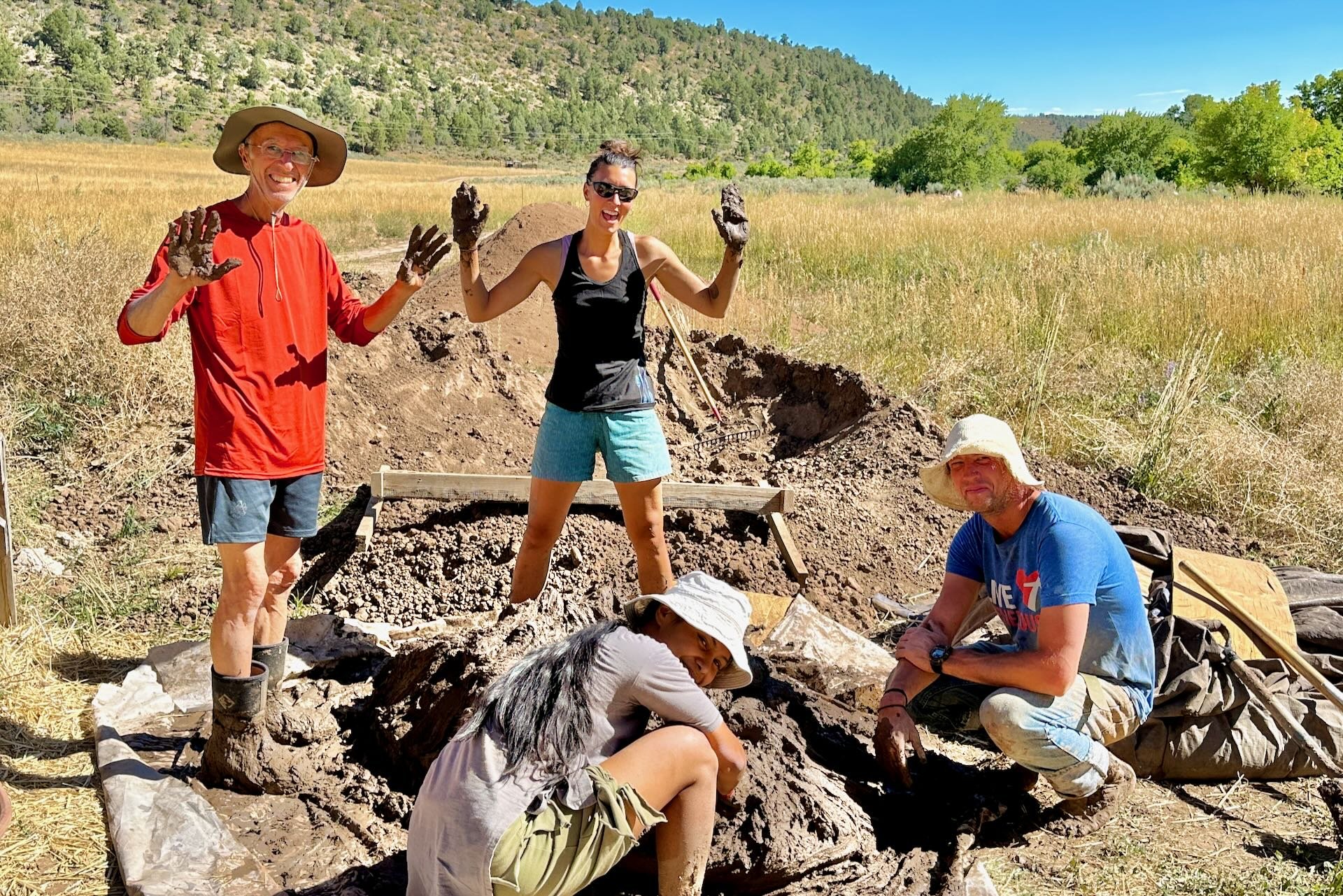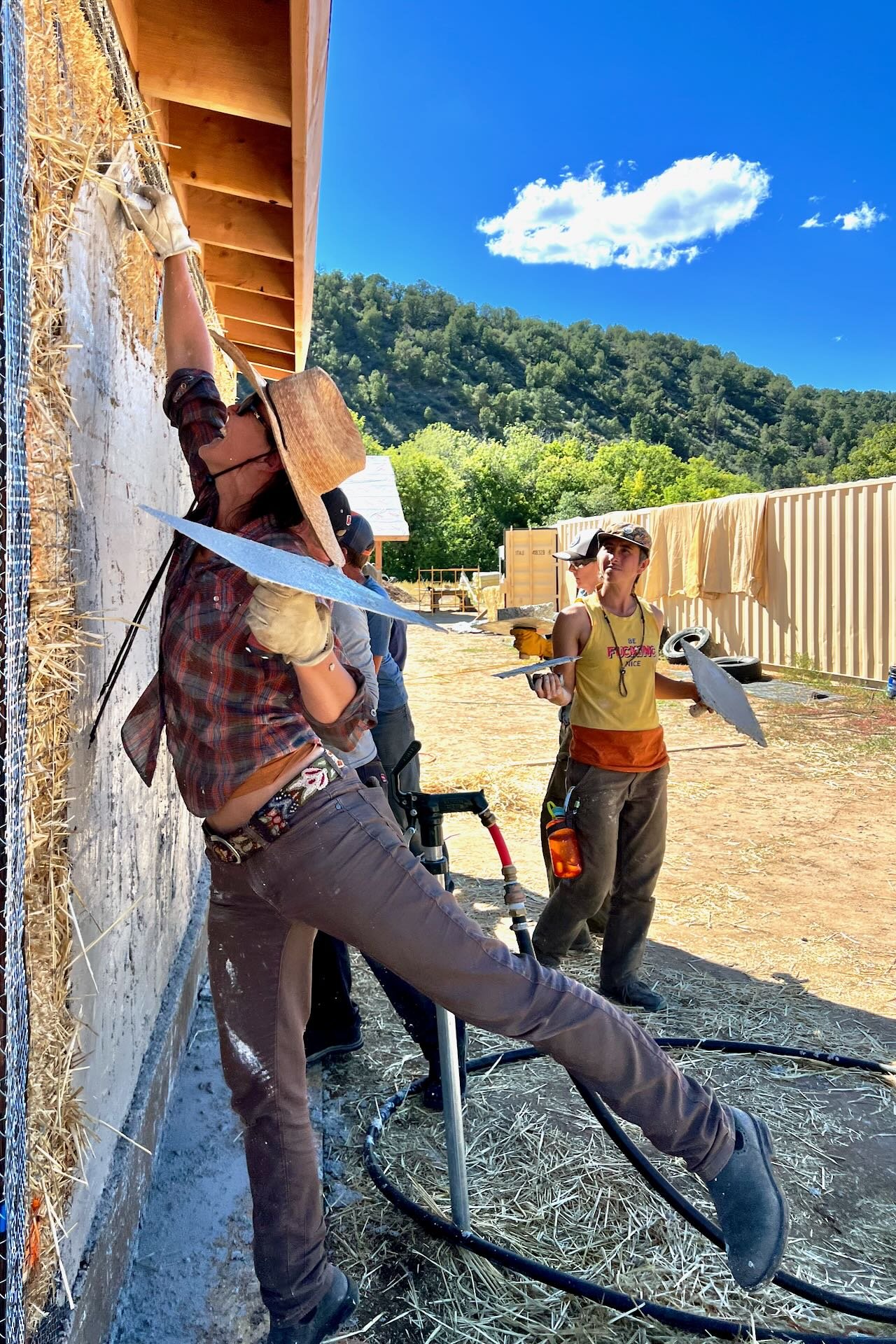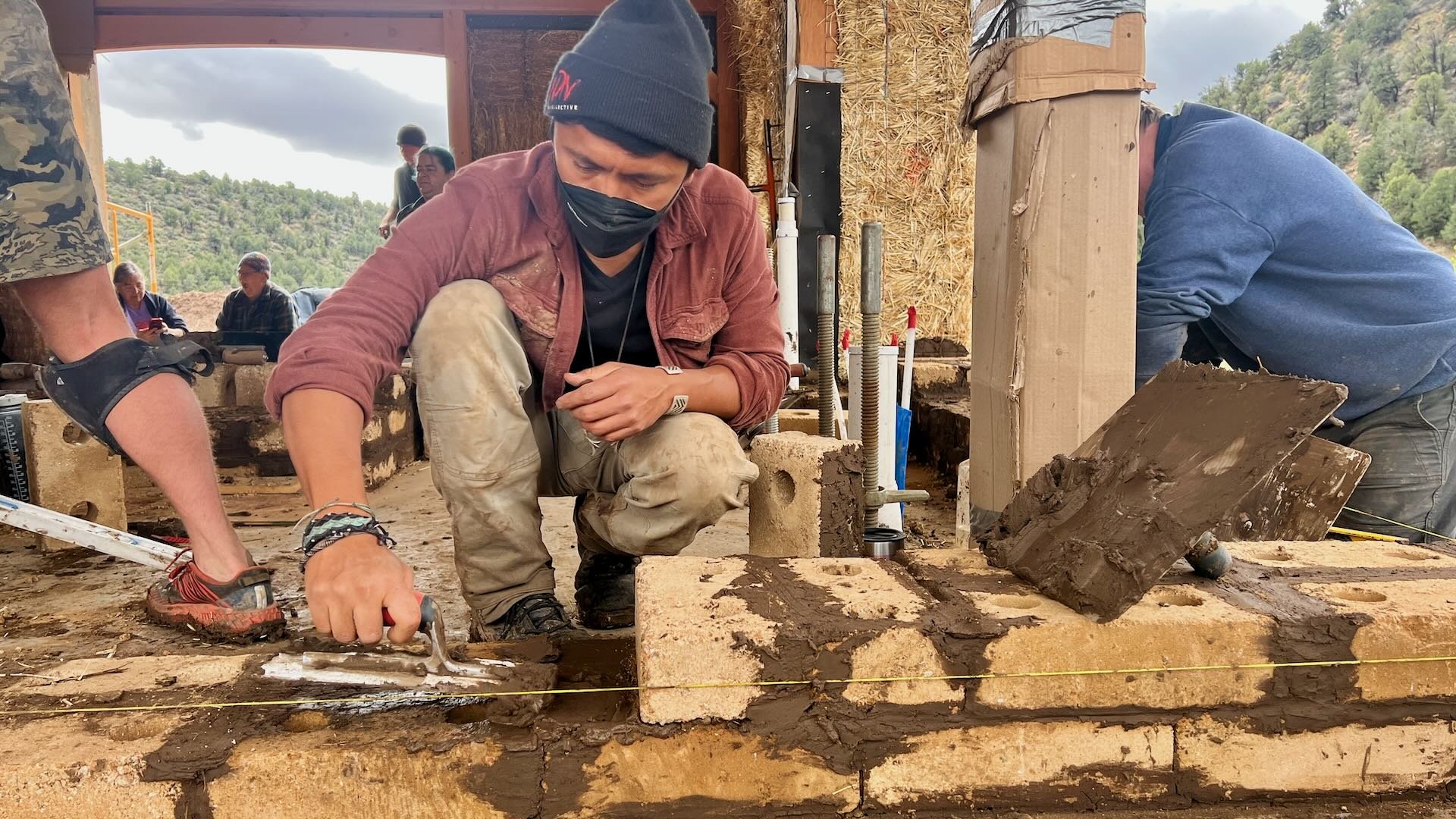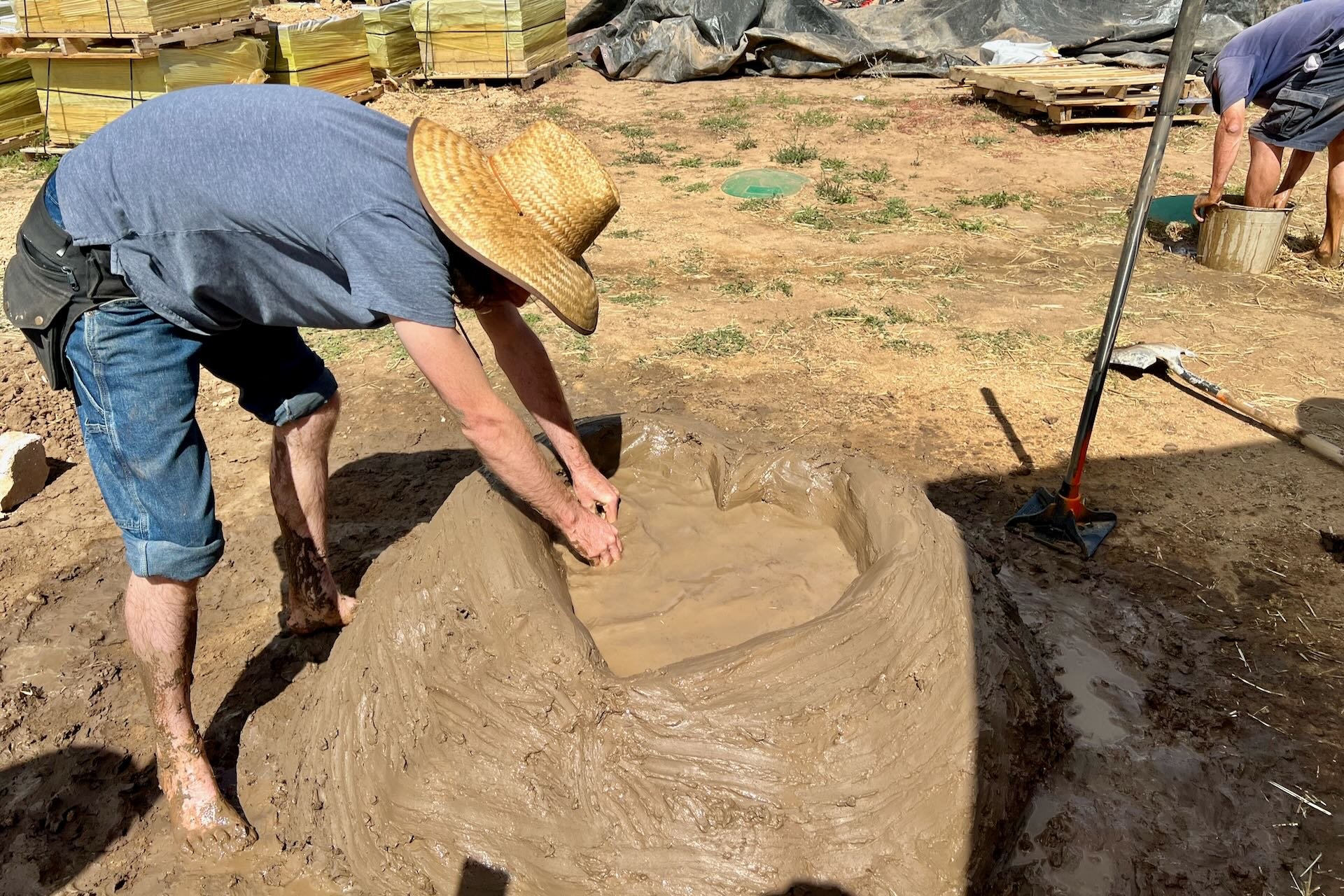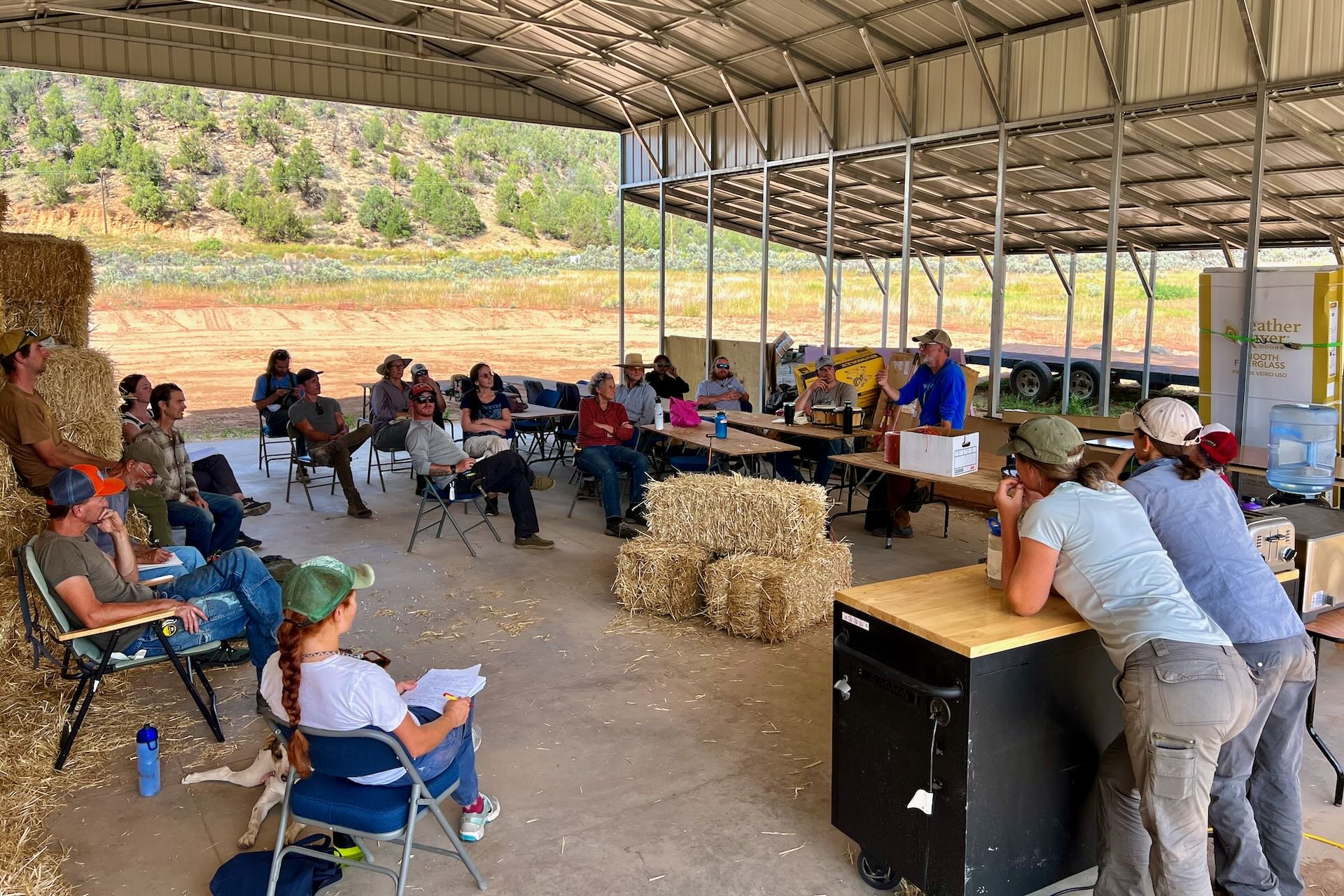INTEGRATING OUTER & INNER SUSTAINABILITY
Learn it by living it!
September 10-16, 2023
A one-week residential workshop exploring natural building techniques and our connection to nature. Will provide opportunities to learn and practice some of the foundational skills of earthen building and contemplate living in harmony with nature.
AT A GLANCE
Location: Earthville Institute, Colorado
Dates: September 10-16, 2023
Program format: Residential service-learning workshop with a contemplative approach
Topic: Natural building
Principal instructor: Mark Moore
Additional facilitators: Daphne Charles, Anya Chang-DePuy, James Simmons
Language: English (translation may be possible)
Building a Better World? Yes, this workshop-retreat qualifies as a module in the Building a Better World program and provides two weeks of credit toward certification in that program.
INTRODUCTION
Earthville Institute is pleased to announce its second annual Touching Earth workshop for 2023!
This interdisciplinary workshop-retreat will provide opportunities to learn and practice some of the foundational skills of natural, eco-friendly earthen building and contemplate living in harmony with nature while enjoying a healthy and sustainable lifestyle in a beautiful part of Colorado.
For those with interest and time, the workshop will be followed by an optional practicum enabling participants to continue deepening their learning and refining their skills by staying on as a volunteer and working alongside our team in the ongoing building work.
NATURAL BUILDING
Sustainable, Healthy, Affordable & Beautiful Homes
There's a reason that earthen building is enjoying a renaissance around the world: it is simply one of the wisest ways to build. The many benefits of earthen buildings and clay plasters include:
Sustainability (one of the most eco-friendly ways to build)
Human health (no toxic materials, vapor permeability while maintaining insulative qualities)
Better thermal properties (balance of insulation and thermal mass)
Optimal acoustic properties (good sound insulation and natural acoustic profile)
Better fire resistance (compared with many conventional building materials)
Affordability (especially when DIY with the support of friends)
Natural beauty with a wide range of design flexibility
We can help you achieve these benefits in your own building, with an emphasis on best practices and a context-responsive approach that will support you to get the best results possible for your unique needs.
What we’ll be learning
Hands-on learning projects will include:
Applying clay plaster to interior straw-bale walls
Applying lime plaster to exterior straw-bale and mud-brick walls
Masonry: building walls with mud bricks and mud mortar (including best practices, bond patterns, etc.)
Creating optimal mud mixes for all of these applications (plasters, bricks and mortar), including DIY soil testing, harvesting, sieving, pugging (mixing with the feet), preparing, and testing the mixes
Possible work on other projects
The hands-on work will be enriched by discussions, presentations, and other activities to provide greater depth and breadth of knowledge, including discussions of best practices for all of the above activities, and why each of them matters.
A presentation on earth as a building material, including both the science of how earth holds together as a building material, and the art of earthen building as explored through a slideshow discussion of earthen architecture around the world (including our eco-campus in the Himalayas).
An overview of other earthen building materials and techniques, with a look at the pros and cons of each, and how to evaluate the best materials and methods to use in your own unique situation.
Daily morning yoga and meditation practice to ground into our earth body, restore balance and vitality.
Discussions exploring our connection with the Earth, and with nature more generally, and how we cultivate a deeper sense of connectedness with nature in a cultural context that has lost most of that wisdom.
Meditative nature walks on the 640-acre grounds, and other opportunities to observe the earth in the context of the site and discuss what we observe.
Consistent with the contemplative theme of the program, all of the hands-on work will be supported by reflection, journaling, sharing and group discussions, to help everyone get the most out of the experience.
All of the above activities together will provide a well-balanced integration of theory and practice, will empower participants with basic skills and important sensitivities, and will provide a good foundation for further explorations (whether those might be with us or elsewhere).
In support of the contemplative foundation of this program, there will be time for a group practice session every morning (e.g. meditation, yoga, chi kung). For those who also wish to keep up their existing yoga and/or meditation practices, a practice space will be available in the mornings before breakfast and in the evenings.
CAMPUS LIFE: USEFUL THINGS TO KNOW
The experience of living in community
Most of our long-term participants tell us that the experience of being a part of the Earthville community, living and working together, is one of the best parts of our programs for them. We emphasize a culture of kindness and cooperation rather than selfishness and competition, and it’s great to live and work with kindred spirits in that kind of environment.
Earthville maintains an environment in which everyone is supported to learn and grow through reflecting on our interactions with one another, and this kind of learning truly changes lives for the better, because few lessons are more valuable than those that help us understand ourselves and others better and learn to relate with others more sensitively and skillfully.
So one thing to understand is that learning to be a healthy part of a healthy community is one of the most important aspects of all of our residential programs — and of compassionate living more generally — so that kind of inner work and social evolution should be something that appeals to you if you’re thinking of applying for this program. We’ll be spending time talking about it and asking you to self-reflect, journal, and share with others about your experiences, which benefits everyone.
What to expect
Two of the keys to happiness are: (1) to have realistic expectations to begin with; and (2) not to be too attached to those expectations, but rather to stay flexible as life unfolds. With that in mind, here are some of the things participants can expect (while remembering to keep a flexible attitude).
Full-time program focus: For this immersive residential workshop, the point is to be completely focused on the program. While there will be some time for rest, reading, journaling, and personal reflection, there won’t be time for activities unrelated to the workshop. While you’re here, the expectation is that your full attention will be focused on the program experience from start to finish.
Emotional work: In a contemplative program such as this where we’re exploring some of life’s big questions, it is normal for a range of emotions to come up, and for many this is a necessary part of the process — a good sign. We encourage all participants to prepare yourselves to welcome whatever you and other might experience and hold a supportive space to move through it without judgment and learn all we can from it.
Supportive routine: A daily rhythm of contemplative practice, outdoor activities, discussions, and silent meditation time.
Natural simplicity: Rustic living, camping in a beautiful forest setting, bathing in an outdoor shower, etc.
Yogic lifestyle: Clean and simple ashram-style lifestyle in which everyone contributes to the running of the place, including cleaning, washing dishes, etc.
Healthy food: Natural and organic, purely vegetarian meals (100% plant-based, vegan), lovingly prepared by all of us (together or in shifts).
Digital detox: In support of the immersive experience, we encourage everyone to put your phones in airplane mode most of the time you’re here so you can give yourself (and others) the ginormous gift of being present with nature and with one another. For those who are normally glued to your phones, it may take some adjustment at first but soon you’ll be amazed how much better you feel engaging with nature and fulfilling activities with good people rather than the screen. Also, cell service is very spotty here, but you can use our WiFi during free time and for emergencies.
SCHEDULES & DATES
Program schedule: Start and end dates
The program will begin at 10:00am on Day 1. All newly arriving participants should plan to arrive either the afternoon before Day 1 (between 3:00pm and 5:00pm) or between 9:00 and 9:30am on Day 1 itself (we will provide detailed timing, instructions, and travel tips after confirming your registration). On the arrival day, you’ll be settling in and getting oriented, with introductions and an overview of life at Earthville Institute in general and of this program in particular.
The program will conclude at 4:00pm on the last day. Participants who are leaving after the program can plan to depart at 4:30pm on the last day (or, alternatively, by noon the following day).
Daily schedules: What will the days be like?
Although the day-to-day schedule will vary a bit, the schedule for a typical day during this program would more or less as follows:
6:00 Wake
6:30 Morning practice (group yoga/movement or your own contemplative practice)
8:00 BREAKFAST
9:00 Morning sessions: learning, practice, and/or creative activities
12:30 LUNCH
2:00 Afternoon sessions: learning, practice, and/or creative activities
5:00 Personal time
6:00 DINNER
7:00 Evening session: meditation and often a short talk or discussion
8:30 Quiet time for journaling, reading and personal meditation
9:30 Lights out
ABOUT THE INSTRUCTORS & FACILITATORS
Touching Earth will be hosted and facilitated by members of Earthville Institute’s core community. The main instructor for the natural building aspects of the program will be Mark Moore, cofounder of Earthville Institute and of Dharmalaya Institute (our sister school in the Himalayas). All other aspects of the program will be cofacilitated by the whole team.
PROGRAM FEES
Earthville Institute is a not-for-profit charitable and educational organization, and as such seeks to make its programs accessible everyone. Recognizing that our participants come from diverse backgrounds, we provide a sliding scale with three tiers, to make it possible for each participant to give according to their means. The total cost (inclusive of workshop/retreat fees, three healthy meals daily, and use of our eco-campground) for this one-week program at each of the three tiers are as follows:
Subsidized rate
(For low-income participants who can’t afford the standard rate)
$360
For transparency: This subsidized rate is approximately 33% below our break-even rate, which means it is not enough to cover the Institute’s costs, though hopefully that shortfall might be covered by other participants who choose to pay the “supporter rate” to the right.
Standard rate
(For most participants)
$540
For transparency: This standard rate is essentially a break-even rate, just enough to cover the Institute’s total estimated costs in providing this program.
Supporter rate
(For those with means to help subsidize lower-income participants)
$720
For transparency: This supporter rate is approximately 33% above the break-even rate, and that surplus will be used to support lower-income applicants to participate at the subsidized rate. We thank you sincerely for your generosity in choosing this rate if you can.
Practicum option
Costs for the practicum (the second week) would be one third (33%) less than those for the first week. So, for example, the standard rate for camping on-site for the second week would be $360 instead of $540, making $900 total for the whole two weeks minus Sunday the 17th (and likewise for the other tiers).
Scholarships available
We do not want cost to be a barrier to a sincere applicant’s participation, so if you have exceptional financial hardship and cannot afford even the lowest subsidized rate, you can contact us to let us know your situation and your needs, and we can discuss work-study discount and scholarship options (subject to limited availability and based on genuine need).
Members of the Ute and Diné (Navajo) nations qualify for full scholarships (subject to limited availability).
IMPORTANT INFORMATION
Before you pack for your trip to Earthville Institute, please read the important information on our Campus Life page. If you have a specific question that is not answered there, feel free to contact us here and we’ll be happy to answer.
APPLICATION PROCESS
Sorry, registration for this program has closed.



